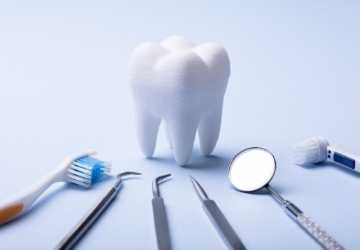The Importance of Regular Dental Checkups
Our teeth are often taken for granted. We use them to chew, talk, and even express emotions through our smiles and frowns. Despite being often used, dental health often takes a backseat to our overall health. That’s where regular dental checkups come into play. By scheduling regular checkups, your dentist can detect potential problems early and prevent minor issues from developing into more serious and costly conditions.
Our teeth are often taken for granted. We use them to chew, talk, and even express emotions through our smiles and frowns. Despite being often used, dental health often takes a backseat to our overall health. That’s where regular dental checkups come into play. By scheduling regular checkups, your dentist can detect potential problems early and prevent minor issues from developing into more serious and costly conditions.
For example, during a regular dental checkup, your dental team will thoroughly examine your teeth, gums, and mouth for signs of cavities, gum disease, oral cancer, or other dental problems to ensure early detection and prompt treatment to maintain optimal oral health.
This blog post explores the importance of regular dental checkups, highlights their benefits, and discusses the various risks that come with neglecting them, while providing a detailed breakdown of the dental checkup process.

Preventive Benefits of Regular Dental Checkups
There are many preventive benefits to regular dental checkups that can help you keep your mouth in good shape and avoid costly dental treatments in the future. By attending these regular appointments, your dentist can detect potential problems early and take appropriate steps to prevent them from becoming worse and more complicated.
Avoid Major Dental Treatments
Detecting dental problems early is one of the main benefits of routine dental checkups.
Dental problems like cavities, gum disease, or oral cancer may not show obvious symptoms when they are severe. During these consultations, your dentist can quickly diagnose and treat these problems, potentially saving you from later, more complicated, and expensive treatments.
Professional cleanings and routine checkups are essential to preventing gum disease and cavities. During these checkups, plaque and tartar deposits (which can cause these conditions) are effectively removed, reducing the likelihood of new problems.
Early intervention with preventive care can help you avoid expensive treatments, such as root canals, gum surgery, and even tooth extractions.
Maintaining Oral Hygiene
Routine dental checkups help maintain optimal oral hygiene and detect and treat dental problems. Professional cleanings remove stubborn tartar and plaque that brushing and flossing alone cannot remove. This thorough cleaning helps prevent bacteria buildup, which can lead to inflammation, infection, and gum disease.
In addition, your dentist can personally instruct you in proper oral hygiene techniques and recommend products or strategies that are tailored to your specific needs. With this personalized approach, you are guaranteed to have the information and resources you need to maintain optimal oral health between dental appointments.
A Detailed Breakdown of the Dental Exam Procedure
Initial Consultation
When you arrive for your dental appointment, a patient coordinator will greet you and walk you through the necessary paperwork, such as: B. Verify new patient insurance information and fill out forms. Once everything is complete, a team member will direct you to the treatment area, where your medical and dental history will be reviewed, along with any concerns or questions you may have.
Diagnostic Tests
During your initial consultation, your dentist will take digital x-rays of your teeth. These x-rays help to reveal possible problems, such as cavities, gum disease, or other dental issues that may not be visible with a naked eye examination.
Your dentist may also perform other diagnostic tests, such as:
• Bite impressions to detect jaw deformities that affect your bite
• Fluid extraction from swollen gums or abscesses to check for infection
• Referral to a specialist if signs of bone deterioration or deformity are present
• Surgical removal or biopsy of suspicious tissue
• Mouth ulcer swab
These diagnostic tests help your dentist get a comprehensive picture of your oral health and develop a personalized treatment plan.
Cleaning Process
After the initial consultation and diagnostic tests, the dental hygienist will thoroughly clean your teeth. The process typically includes the following steps:
1. Tartar Removal: The dental hygienist uses tiny metal instruments to scrape away plaque and tartar deposits from your teeth. Unlike tartar (hardened plaque that must be professionally removed), plaque is a sticky layer of bacteria that can lead to tooth decay and gum disease if left untreated.
2. Polishing: After your teeth are clean of plaque and tartar, the dental hygienist uses a powerful electric toothbrush and coarse toothpaste to polish your teeth and remove the last of the debris.
3. Flossing: Dental hygienists use floss to remove plaque or food particles between teeth.
4. Rinse: To remove particles left behind during the cleaning process, rinse your mouth thoroughly.
5. Fluoride treatment: Dental hygienists may use fluoride gel, foam, or fluoride as a final treatment to strengthen tooth enamel and prevent cavities.
Understand the Risks of Neglecting Dental Checkups
Neglecting regular dental checkups can have serious consequences for your oral and overall health. Here are some of the risks of skipping these important dates:
Development of serious dental problems
• Cavities and Cavities
One of the most immediate risks of neglecting your dental health is the development of cavities and cavities. Holes are caused by plaque, a sticky film of bacteria that attacks tooth enamel by producing acid. Without proper dental care, these cavities can deepen and lead to pain, infection, and even tooth loss.
• Gum Disease
Periodontitis, another name for gum disease, can also be caused by neglecting your dental health. It occurs when tartar and plaque build up along the gum line, causing the gums to become inflamed and infected.
Gum disease can take many different forms, from mild gingivitis, characterized by red and swollen gums, to more severe forms such as periodontitis, which can lead to bone loss and gum recession. In advanced stages, untreated gum disease can even lead to tooth loss.

• Systemic Health Risks
Perhaps less well known are the systemic health risks associated with neglecting dental health. A growing body of research links respiratory infections, diabetes, and heart disease to dental health.
Poor dental hygiene can introduce harmful bacteria into the bloodstream, which can lead to inflammation and infection elsewhere in the body. For example, people with advanced gum disease may be more susceptible to heart disease and stroke, as well as other cardiovascular problems.
Higher Health Care Costs
• Expensive Dental Treatments
If dental problems go untreated, more invasive and expensive treatments are often required. Depending on the severity of the gum disease, the total cost of direct treatment can vary widely, from $500 to $10,000. Expensive restorative dental treatments also include crowns ($600 to $1,000) and dental implants ($2,000 or more).
• Impact on Overall Health Care Costs
For people with coronary heart disease and diabetes, regular dental cleanings appear to help prevent more serious and expensive health problems. According to one study, people with diabetes who received preventive dental care saved an average of $549, while people with coronary artery disease who visited the dentist saved $548, and people with both conditions saved about $866.
• Financial Barriers
People’s inability to pay often prevents them from receiving timely dental care. More than half of Americans know that getting dental care now can save money later and therefore put it off because they can’t afford it. Additionally, many insurance plans, including Medicare, don’t cover dental care, which leaves many people, especially seniors, paying out of pocket for routine care that they must pay for.
If you neglect regular dental visits, you’re not only putting your oral health at risk, you’re also increasing your chances of developing more serious and costly dental problems and possible systemic health complications.
The Final Word
Proactive dental care practices, such as scheduling routine checkups, learning good oral hygiene habits, and living a healthy lifestyle can significantly improve your quality of life. By prioritizing your dental health, you can enjoy a confident smile, improve your overall health, and have peace of mind by taking preventative measures to protect your health.